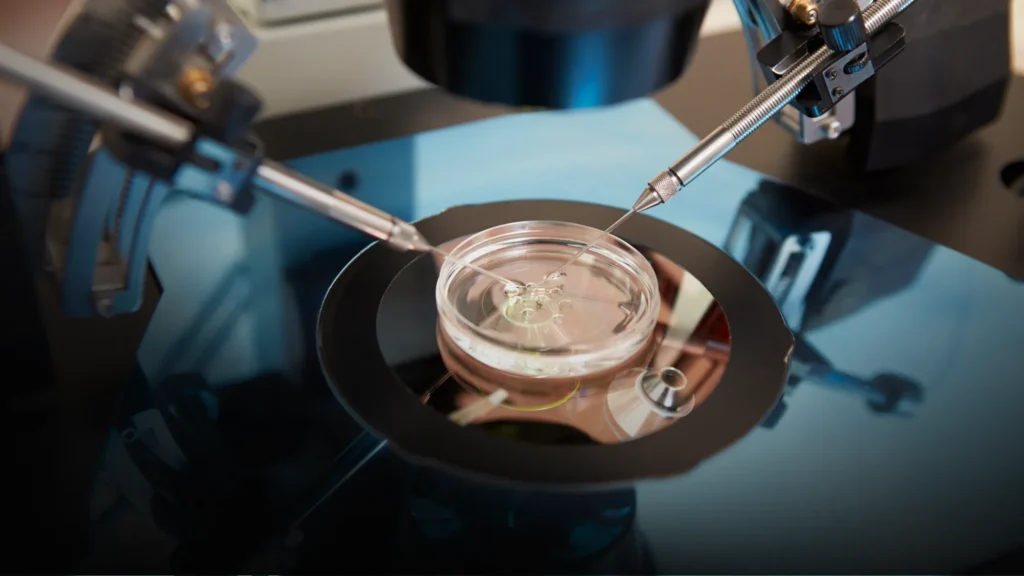If you’re considering in vitro fertilization (IVF), understanding the medications involved is a crucial step. At Hope Fertility, our experienced in vitro fertilization doctors in Atlanta, GA, guide patients through every phase of the IVF process, ensuring clarity and confidence. Below, we break down the most common medications used during an IVF cycle and their roles in supporting your fertility journey.
Why Are Medications Essential in IVF?
IVF medications are designed to optimize your body’s natural reproductive processes. They help stimulate the ovaries, control ovulation timing, and prepare the uterine lining for embryo implantation. The ultimate goal is to increase the chances of a successful pregnancy by retrieving multiple healthy eggs and creating the best possible environment for embryo development.
Key Medications Used During an IVF Cycle
- Clomiphene Citrate (Clomid, Serophene)
– Purpose: Induces ovulation in women who do not naturally produce eggs.
– How It Works: Mimics estrogen to increase hormone levels that trigger ovulation.
– Administration: Oral tablet, typically taken once daily for five days early in the menstrual cycle.
- Gonadotropins
– Purpose: Stimulate the ovaries to produce multiple follicles (each containing an egg).
– Types:
– FSH (Follicle-Stimulating Hormone): Gonal-f, Follistim
– LH (Luteinizing Hormone): Often combined with FSH in medications like Menopur, Repronex
– hCG (Human Chorionic Gonadotropin): Pregnyl, Ovidrel, Profasi, used to trigger final egg maturation before retrieval
– Administration: Injectable, usually under the skin of the abdomen or thigh, once daily for 7–14 days.
- GnRH Agonists and Antagonists
– Purpose: Prevent premature ovulation, ensuring eggs are retrieved at the optimal time.
– Common Medications:
– Agonists: Leuprolide acetate (Lupron)
– Antagonists: Cetrotide, Ganirelix
– Administration: Injection, timing and dosage depend on your specific protocol.
- Progesterone
– Purpose: Supports the uterine lining and helps maintain early pregnancy after embryo transfer.
– Forms: Injectable progesterone in oil, vaginal suppositories (Endometrin), gels (Crinone), or oral tablets (Prometrium).
– Administration: Begins after egg retrieval and continues through the early weeks of pregnancy if needed.
- Pre-cycle Synchronization Medications
– Purpose: Prepare the ovaries and synchronize follicle development before stimulation.
– Examples: Birth control pills, oral estrogen (Estrace), sometimes antagonist injections.
What to Expect from Your IVF Medication Protocol
Your IVF protocol will be tailored by your in vitro fertilization doctors in Atlanta based on your medical history, ovarian reserve, and treatment goals. The process typically involves:
– Precycle preparation: May include oral contraceptives or estrogen.
– Ovarian stimulation: Daily injections of gonadotropins.
– Ovulation suppression: GnRH agonists or antagonists to prevent premature ovulation.
– Egg maturation trigger: hCG injection before retrieval.
– Luteal phase support: Progesterone supplementation after retrieval and transfer.
Partnering with Hope Fertility
At Hope Fertility, our team of in vitro fertilization doctors in Atlanta, GA, is dedicated to providing personalized care and clear guidance throughout your IVF journey. We ensure you understand each medication’s purpose, administration, and potential side effects, empowering you to move forward with confidence.
Ready to take the next step? Contact Hope Fertility today to schedule a consultation with our expert in vitro fertilization doctors in Atlanta, GA.
This blog is for informational purposes only and does not replace professional medical advice. Always consult with your fertility specialist regarding your specific treatment plan.




